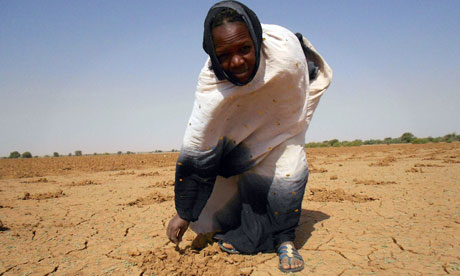Climate change killing trees across the Sahel, says study
One in six trees in the Sahel has died since the 1950s as temperatures rise, threatening livelihoods

Parched ground in Oud Guedara, west Africa. Long-term drought is killing trees in the Sahel, according to a new study. Photograph: Irina Fuhrmann/AFP/Oxfam
Trees throughout Africa's Sahel region — vital to peoples' livelihoods — are dying as a result of long-term drought linked to climate change, according to a study.
It found that one in six trees in the region has died since the 1950s, whilst a fifth of species has disappeared locally, because of rising temperatures and lower rainfall linked to climate change.
At some sites, average temperatures rose by 0.8 degrees Celsius and rainfall decreased by 48 per cent. Trees have shifted southward towards wetter areas.
This shift in the vegetation zones could have a severe impact on the lives of the Sahel's population warned Patrick Gonzalez, a climate change scientist from the University of California, Berkeley, in the United States, and lead author of the study, published online in the Journal of Arid Environments last week.
"People in the Sahel depend on trees for maintaining soil fertility and for firewood, hut poles, food and other essentials of life … so the loss of trees directly harms people's livelihoods," he told SciDev.Net.
The researchers combined aerial photographs captured between 1954 and 1989, field data from 2000–2002 relating to tree size and numbers and high-resolution satellite images from 2002 to show how tree distribution has changed across the region. Statistical analysis that compared this information with factors such as temperature, rainfall, human population and soil fertility showed that climate outweighed all other factors in driving this change, said Gonzalez.
Farmers in the region are already being forced to alter their techniques in response to changing climate. Many already practise natural regeneration — where they select, prune, and raise small trees to maturity in their fields — as an adaptation to climate change.
Farouk El-Baz, research professor and director of the Centre for Remote Sensing at Boston University, United States, said that, although the observations sounded credible, he found it difficult to believe that rising temperatures alone could be responsible for the lack of rain.
"The rain that reaches the Sahel does not originate there but it is part of the monsoon system. Thus a local rise in the temperature [would have] no effect on rain clouds," he said.
El-Baz, well known for his studies on arid landscapes — particularly deserts — said cyclical variation in rainfall as shown by previous drought periods must be considered, explaining that dry spells in the Sahel fluctuated drastically almost every seven years.
The study was partially funded by NASA (the National Aeronautics and Space Administration) and the US Geological Survey.
It found that one in six trees in the region has died since the 1950s, whilst a fifth of species has disappeared locally, because of rising temperatures and lower rainfall linked to climate change.
At some sites, average temperatures rose by 0.8 degrees Celsius and rainfall decreased by 48 per cent. Trees have shifted southward towards wetter areas.
This shift in the vegetation zones could have a severe impact on the lives of the Sahel's population warned Patrick Gonzalez, a climate change scientist from the University of California, Berkeley, in the United States, and lead author of the study, published online in the Journal of Arid Environments last week.
"People in the Sahel depend on trees for maintaining soil fertility and for firewood, hut poles, food and other essentials of life … so the loss of trees directly harms people's livelihoods," he told SciDev.Net.
The researchers combined aerial photographs captured between 1954 and 1989, field data from 2000–2002 relating to tree size and numbers and high-resolution satellite images from 2002 to show how tree distribution has changed across the region. Statistical analysis that compared this information with factors such as temperature, rainfall, human population and soil fertility showed that climate outweighed all other factors in driving this change, said Gonzalez.
Farmers in the region are already being forced to alter their techniques in response to changing climate. Many already practise natural regeneration — where they select, prune, and raise small trees to maturity in their fields — as an adaptation to climate change.
Farouk El-Baz, research professor and director of the Centre for Remote Sensing at Boston University, United States, said that, although the observations sounded credible, he found it difficult to believe that rising temperatures alone could be responsible for the lack of rain.
"The rain that reaches the Sahel does not originate there but it is part of the monsoon system. Thus a local rise in the temperature [would have] no effect on rain clouds," he said.
El-Baz, well known for his studies on arid landscapes — particularly deserts — said cyclical variation in rainfall as shown by previous drought periods must be considered, explaining that dry spells in the Sahel fluctuated drastically almost every seven years.
The study was partially funded by NASA (the National Aeronautics and Space Administration) and the US Geological Survey.
No comments:
Post a Comment